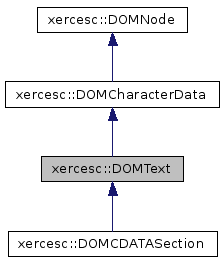
DOMText interface inherits from DOMCharacterData and represents the textual content (termed character data in XML) of an DOMElement or DOMAttr.
More...
#include <DOMText.hpp>
Inheritance diagram for xercesc::DOMText:

Public Member Functions | |
Functions introduced in DOM Level 1 | |
| virtual DOMText * | splitText (XMLSize_t offset)=0 |
Breaks this node into two nodes at the specified offset, keeping both in the tree as siblings. | |
Functions introduced in DOM Level 3 | |
| virtual bool | getIsWhitespaceInElementContent () const=0 |
| Returns whether this text node contains whitespace in element content, often abusively called "ignorable whitespace". | |
| virtual const XMLCh * | getWholeText ()=0 |
Returns all text of DOMText nodes logically-adjacent text nodes to this node, concatenated in document order. | |
| virtual DOMText * | replaceWholeText (const XMLCh *content)=0 |
| Substitutes the a specified text for the text of the current node and all logically-adjacent text nodes. | |
Non-standard extension | |
| virtual bool | isIgnorableWhitespace () const=0 |
| Non-standard extension. | |
DOMText interface inherits from DOMCharacterData and represents the textual content (termed character data in XML) of an DOMElement or DOMAttr.
If there is no markup inside an element's content, the text is contained in a single object implementing the DOMText interface that is the only child of the element. If there is markup, it is parsed into the information items (elements, comments, etc.) and DOMText nodes that form the list of children of the element.
When a document is first made available via the DOM, there is only one DOMText node for each block of text. Users may create adjacent DOMText nodes that represent the contents of a given element without any intervening markup, but should be aware that there is no way to represent the separations between these nodes in XML or HTML, so they will not (in general) persist between DOM editing sessions. The normalize() method on DOMNode merges any such adjacent DOMText objects into a single node for each block of text.
See also the Document Object Model (DOM) Level 2 Core Specification.
| xercesc::DOMText::DOMText | ( | ) | [inline, protected] |
| xercesc::DOMText::DOMText | ( | const DOMText & | other | ) | [inline, protected] |
| virtual xercesc::DOMText::~DOMText | ( | ) | [inline, virtual] |
Destructor.
| xercesc::DOMText::DOMText | ( | ) | [inline, protected] |
| xercesc::DOMText::DOMText | ( | const DOMText & | other | ) | [inline, protected] |
| virtual xercesc::DOMText::~DOMText | ( | ) | [inline, virtual] |
Destructor.
| virtual DOMText* xercesc::DOMText::splitText | ( | XMLSize_t | offset | ) | [pure virtual] |
Breaks this node into two nodes at the specified offset, keeping both in the tree as siblings.
After being split, this node will contain all the content up to the offset point. A new node of the same type, which contains all the content at and after the offset point, is returned. If the original node had a parent node, the new node is inserted as the next sibling of the original node. When the offset is equal to the length of this node, the new node has no data.
| offset | The 16-bit unit offset at which to split, starting from 0. |
| DOMException | INDEX_SIZE_ERR: Raised if the specified offset is negative or greater than the number of 16-bit units in data. NO_MODIFICATION_ALLOWED_ERR: Raised if this node is readonly. |
| virtual bool xercesc::DOMText::getIsWhitespaceInElementContent | ( | ) | const [pure virtual] |
Returns whether this text node contains whitespace in element content, often abusively called "ignorable whitespace".
An implementation can only return true if, one way or another, it has access to the relevant information (e.g., the DTD or schema).
"Experimental - subject to change"
This attribute represents the property [element content whitespace] defined in .
| virtual const XMLCh* xercesc::DOMText::getWholeText | ( | ) | [pure virtual] |
Returns all text of DOMText nodes logically-adjacent text nodes to this node, concatenated in document order.
"Experimental - subject to change"
| virtual DOMText* xercesc::DOMText::replaceWholeText | ( | const XMLCh * | content | ) | [pure virtual] |
Substitutes the a specified text for the text of the current node and all logically-adjacent text nodes.
"Experimental - subject to change"
This method returns the node in the hierarchy which received the replacement text, which is null if the text was empty or is the current node if the current node is not read-only or otherwise is a new node of the same type as the current node inserted at the site of the replacement. All logically-adjacent text nodes are removed including the current node unless it was the recipient of the replacement text.
Where the nodes to be removed are read-only descendants of an DOMEntityReference, the DOMEntityReference must be removed instead of the read-only nodes. If any DOMEntityReference to be removed has descendants that are not DOMEntityReference, DOMText, or DOMCDATASection nodes, the replaceWholeText method must fail before performing any modification of the document, raising a DOMException with the code NO_MODIFICATION_ALLOWED_ERR.
| content | The content of the replacing DOMText node. |
DOMText node created with the specified content. | DOMException | NO_MODIFICATION_ALLOWED_ERR: Raised if one of the DOMText nodes being replaced is readonly. |
| virtual bool xercesc::DOMText::isIgnorableWhitespace | ( | ) | const [pure virtual] |
Non-standard extension.
Return true if this node contains ignorable whitespaces only.
 1.5.1
1.5.1